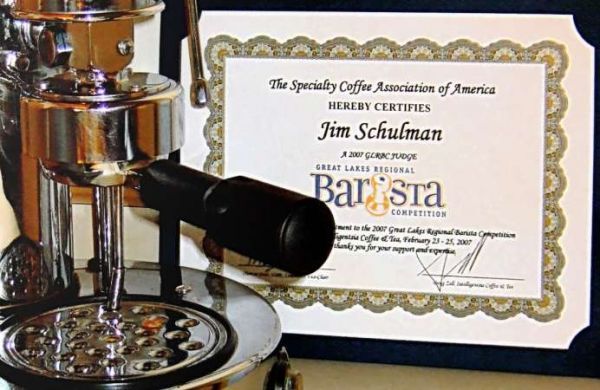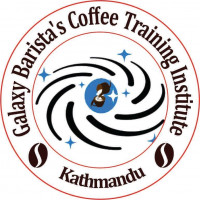Why Barista Certification Isn’t Just a Piece of Paper—It’s a Career-Changer

Strong 8k brings an ultra-HD IPTV experience to your living room and your pocket.
Whether you are a coffee snob looking to turn pro at the barista job or an individual looking to transition into something more thrilling, barista certification is likely not high on your list. I mean, can't you simply learn on the job?
That's a fair question—and one that many newcomers have. But the truth is, in today's competitive coffee world, formal training and certification can be a definite advantage. It's not just a question of pouring latte art or learning machine cleaning. It's about building a skill set that employers can trust and customers appreciate.
In this blog, we’ll break down why getting certified as a barista is more than just a checkbox—it’s a launchpad for long-term success in the coffee industry.
What is a Barista Certification?
Let’s start simple. A barista certification is an official acknowledgment that you’ve been trained in key areas of the coffee-making process—things like operating an espresso machine, understanding grind size, milk frothing, cleaning practices, customer service, and even coffee bean origins.
These certificates are typically provided by professional training centers or accepted coffee academies. Some of them are regional and others follow international standards. Either way, they give order and legitimacy to your learning.
Why Experience Alone Isn't Always Enough
Most coffee shops will happily hire untrained baristas, ideal for getting your foot in the door. Here's the catch: doing it all from hands-on learning typically means learning through trial and error. You may end up with bad habits, leave out important techniques, or lack confidence to experiment and build.
Barista training fills those gaps by giving you substance. You don't just learn to do it—you learn why.
Here's how it is: would you hire a chef with no training in food safety or knife skills? No way. Likewise, a trained barista stands out for knowing the science and craft behind every cup.
What You Learn During Barista Training
A quality certification program doesn't just leave you standing in front of a machine. It walks you through step by step the skills you need to acquire to work on your own in a real café environment. Here's what you'll typically learn:
1. Espresso Basics
You'll learn how to grind the coffee, tamp it, and pull a balanced shot of espresso. Timing, temperature, and pressure are all at play here.
2. Milk Frothing Skills
Achieving that perfect silky microfoam isn't just for Instagram. It's necessary to create cappuccinos and lattes. You will learn to steam milk with precision.
3. Cleaning and Maintenance
Most of the job is in maintaining equipment operational. Training will demonstrate how to safely and effectively maintain machines—something many on-the-job learners forget.
4. Customer Service
Coffee is one-on-one. Certification courses often cover customer handling, stress management, and teamwork lessons.
5. Coffee Knowledge
Bean to brew, you'll discover coffee origins, roast levels, grind sizes, and brewing methods. This training helps you answer customers' questions and recommend with confidence.
Career Benefits of Being Certified
You may ask yourself—will this actually get me a better job? The answer is yes.
1. Be a Cut Above in Job Opportunities
There are just so many people competing for the same cafe jobs, so certification makes you a standout. It says that you're professional, skilled, and ready to work right away.
2. Promotion at Lightning Speed
Employers love workers who are proactive. If you already know how to clean and operate machines or train new staff, you'll be promoted quicker than everyone else.
3. Opportunity Overseas
In most countries, barista certification is required or at least highly sought. If you plan to work abroad, it's a useful tool.
4. Better Pay
While not a guarantee, certified baristas generally start with a higher per-hour rate or receive more frequent promotions, especially in specialty coffeehouses.
Self-Assurance in Real Life in a Café Setting
One of the most underrated benefits of a barista certification is how it boosts your confidence behind the counter. Instead of second-guessing every step, you’ll feel sure of what you’re doing.
If a customer orders a flat white using oat milk, you will know how to steam plant-based milk to perfection. Or if a fellow worker is experiencing an issue with the grinder setting—your training kicks in, and you sort it out without needing to get the manager involved.
Such little wins create credibility with your colleagues and customers, and this is how great baristas build their reputation.
Certification vs. Online Tutorials
You might be thinking, "Why not just watch YouTube tutorials instead?"
Here's the catch: online tutorials are helpful, but they lack personalized feedback. A certified course gives you hands-on practice with an instructor who can correct your technique in real-time.
It's like learning to drive. You can watch videos on how to shift gears, but until someone shows you how to do it and watches you try, it's hard to really improve.
Who to Get Certified?
Barista certification is not just for applicants of fine cafés. It is perfect for:
- Newbies who desire to learn the proper way from the start
- Home brewers looking to take their skills to the next level
- Career changers experimenting with career prospects in hospitality
- Current baristas wanting to enhance their knowledge
- Aspiring café owners who want to gain an understanding of operations prior to hiring staff
If you fall in any of the above categories, a certification course can give direction, clarity, and good ROI on your money.
Where to Get Certified in Nepal
Coffee business in Nepal has been on the rise continuously, and more and more cafes are opening in urban areas as well as in tourist destinations. As the business grows, the demand for well-trained baristas grows with it.
Organizations like Galaxy Training Institute are leaders in offering experiential barista training courses grounded in international standards but adapted to the local coffee culture. Their course does not just learn you how to brew—assists you in building a real career.
If you want to know more about the benefits of a barista certification, then this is the ideal place to start.
Final Thoughts: Your Career, Your Brew
Becoming a certified barista is not about having a certificate hanging on your wall. It's about gaining practical skills, having confidence in your art, and opening the door to employment in Nepal and worldwide.
In a profession where enthusiasm is as crucial as precision, barista certification helps you take your enthusiasm to the next level. Whether you want to work at a small café or start your own store in the future, certification is one of the smartest initial steps you can take.
The next time someone says, "It's just coffee," you'll be wise.
Note: IndiBlogHub features both user-submitted and editorial content. We do not verify third-party contributions. Read our Disclaimer and Privacy Policyfor details.


